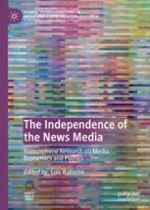This book explores the different ways Francophone research on news media has faced the challenges of dependence and independence from three complementary perspectives. The first is economics - how can sustainable business models be developed and to what extent can crowdfunding help to maintain the financial and editorial independence of newsrooms? Secondly, in a time where the role of journalism in the public sphere is more questioned than ever, the authors evaluate to what extent news media can embody the needs of their readers. Thirdly, the authors consider the historical and political context of publication in the light of the ‘Arab Spring’. This book deals with major, contemporary evolutions of news media, bringing together research that considers the media in France, Canada, and the Arab region (notably Tunisia, Algeria, Morocco, and Egypt). Using numerous case studies, this book helps to define how complex the question of independence is today.
